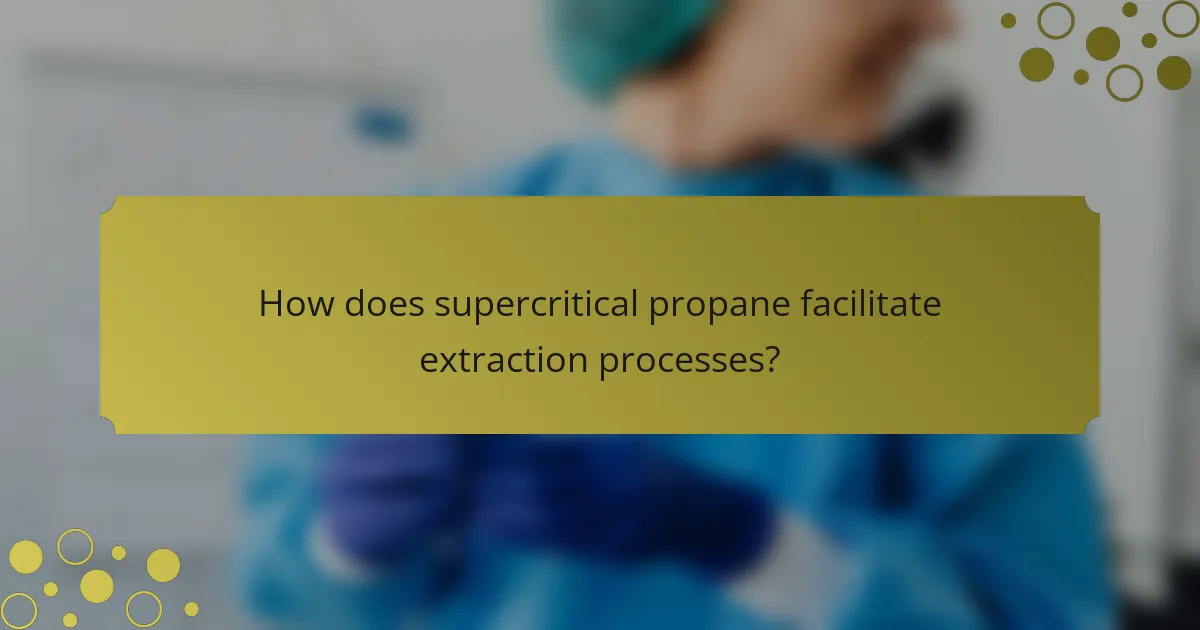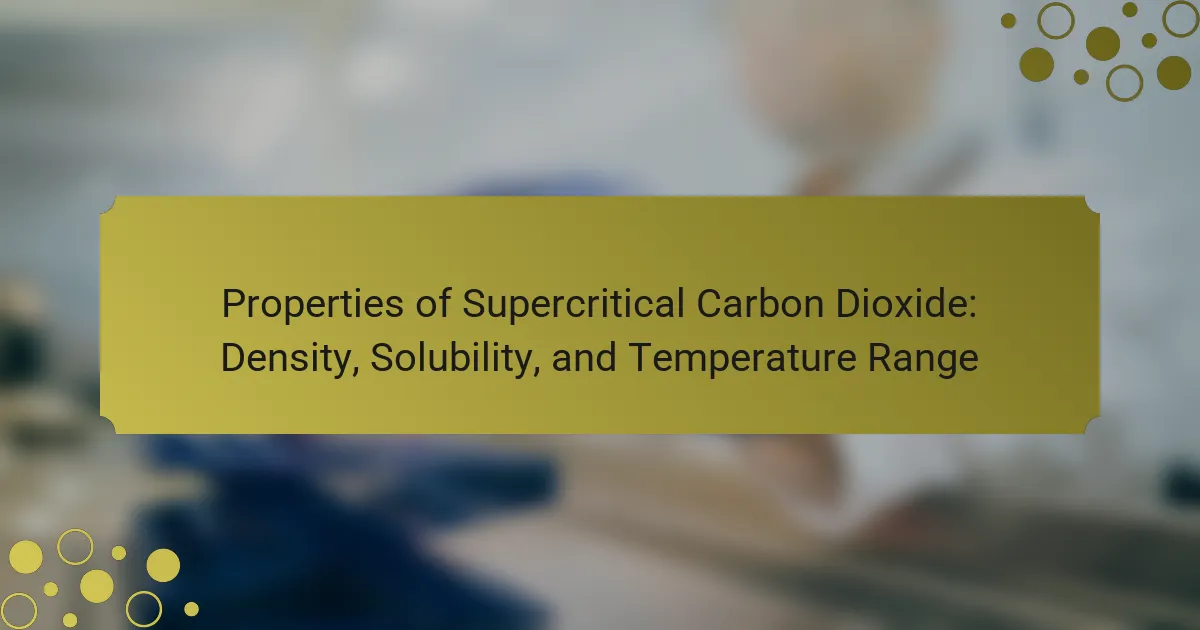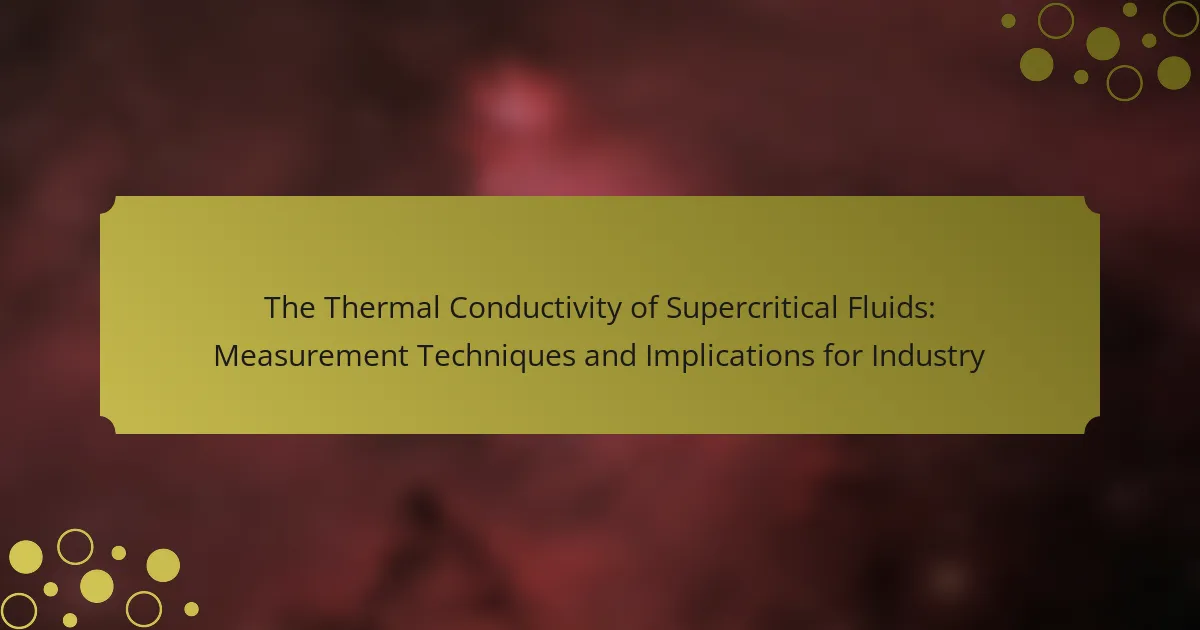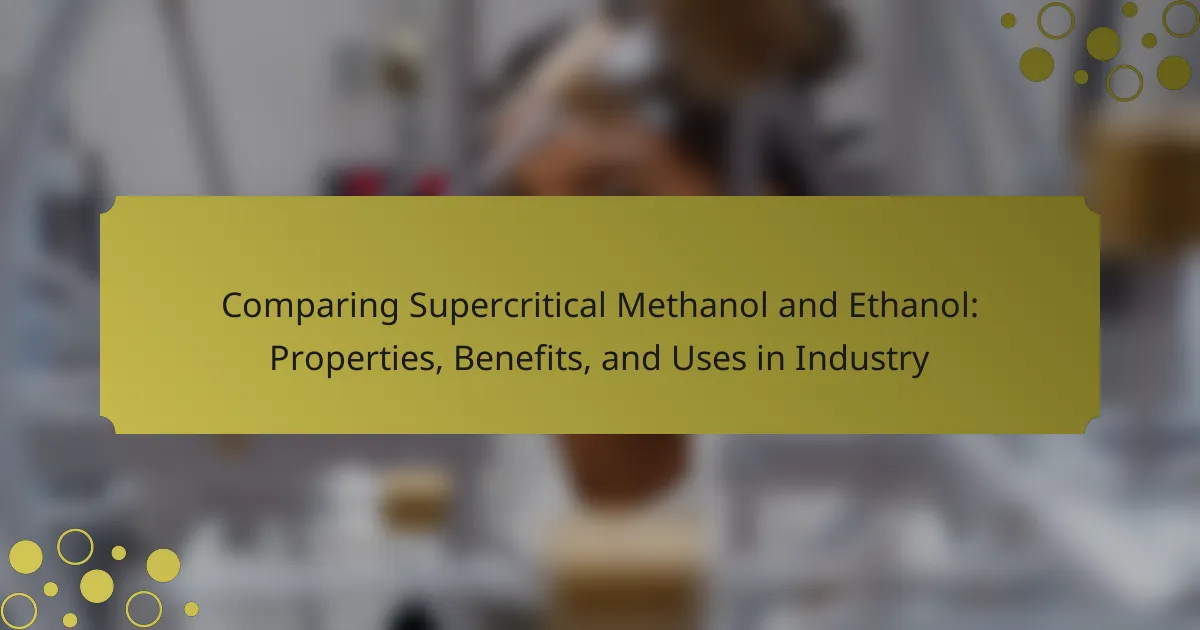Supercritical propane is a unique state of propane that exhibits distinct fluid properties at its critical point, with a critical temperature of approximately 96.7 degrees Celsius and a critical pressure of about 4.25 MPa. In this supercritical state, propane has a density of around 0.58 g/cm³, significantly lower than water, and demonstrates enhanced solvation capabilities due to its low viscosity and high diffusivity. These characteristics enable supercritical propane to effectively dissolve various substances, making it a valuable solvent in extraction processes, particularly in the food and pharmaceutical industries. The tunable density of supercritical propane allows for selective extraction of compounds, while its non-toxic nature supports environmentally friendly practices, promoting greener extraction methods.

What are the supercritical fluid properties of propane?
Propane exhibits unique supercritical fluid properties at its critical point. The critical temperature of propane is approximately 96.7 degrees Celsius. The critical pressure is about 4.25 MPa. In its supercritical state, propane has a density around 0.58 g/cm³. This density is significantly lower than that of water. Supercritical propane can dissolve a variety of substances, enhancing its extraction potential. Its low viscosity allows for efficient mass transfer in extraction processes. These properties make supercritical propane useful in various applications, including natural product extraction and food processing.
How is supercritical propane defined?
Supercritical propane is defined as propane that exists above its critical temperature and pressure. At this state, propane exhibits unique properties that differ from its gaseous and liquid forms. The critical temperature of propane is approximately 96.67°C, and the critical pressure is around 4.25 MPa. In the supercritical state, propane has a density similar to that of a liquid but retains the diffusivity of a gas. This allows for enhanced solvation properties, making supercritical propane effective for extraction processes. The ability to manipulate its density and solvent power is utilized in various industrial applications, such as extraction and separation technologies.
What conditions define propane as a supercritical fluid?
Propane is defined as a supercritical fluid when it is above its critical temperature and critical pressure. The critical temperature of propane is approximately 96.6 degrees Celsius. The critical pressure is about 4.25 MPa. Under these conditions, propane exhibits unique properties. It has a density similar to liquids but can diffuse like gases. This state allows propane to act as an effective solvent in various applications. The combination of high density and low viscosity enhances its extraction potential. These specific conditions enable propane to be utilized in supercritical fluid extraction processes.
What are the key characteristics of supercritical fluids?
Supercritical fluids possess unique characteristics that distinguish them from gases and liquids. They exist above their critical temperature and pressure, where distinct liquid and gas phases do not exist. Supercritical fluids have a density similar to that of liquids, which allows them to dissolve substances effectively. Their viscosity is lower than that of liquids, enabling easier flow and diffusion. Additionally, supercritical fluids can be tuned by adjusting temperature and pressure, which alters their solvating power. These properties make supercritical fluids ideal for applications such as extraction and chromatography. For example, supercritical carbon dioxide is widely used for extracting essential oils and natural compounds due to its efficiency and non-toxic nature.
What is the significance of density in supercritical propane?
Density in supercritical propane is significant because it influences solubility and extraction efficiency. Supercritical fluids exhibit unique properties that change with density variations. Higher density increases the solvent power of supercritical propane. This enhances its ability to dissolve and extract various compounds effectively. For instance, the density of supercritical propane can reach up to 500 kg/m³ near its critical point. This density allows for the efficient extraction of essential oils and flavors in food processing. Additionally, density impacts the mass transfer rates during extraction processes. Thus, understanding density is crucial for optimizing applications of supercritical propane in industrial settings.
How does the density of supercritical propane compare to its liquid and gas forms?
The density of supercritical propane is higher than that of its gaseous form but lower than that of its liquid form. Supercritical propane achieves a density range of approximately 400-600 kg/m³. In contrast, the density of liquid propane is about 493 kg/m³ at its boiling point. The density of gaseous propane at standard conditions is around 1.88 kg/m³. Therefore, supercritical propane occupies a unique position between its liquid and gas states.
What factors influence the density of supercritical propane?
The density of supercritical propane is influenced primarily by temperature and pressure. As the temperature increases, the density typically decreases. Conversely, increasing pressure tends to increase the density of supercritical propane. The critical temperature of propane is approximately 96.7°C, and its critical pressure is around 4.25 MPa. These parameters define the conditions under which propane behaves as a supercritical fluid. At temperatures above the critical temperature, propane cannot be liquefied by pressure alone. The interplay between temperature and pressure determines the density variations in supercritical propane under different conditions.
What role does critical temperature play in propane’s supercritical state?
Critical temperature defines the highest temperature at which propane can exist as a liquid. Above this temperature, propane cannot be liquefied regardless of pressure. This characteristic is crucial for propane’s supercritical state. In supercritical conditions, propane exhibits unique properties such as increased density and enhanced solvent capabilities. The critical temperature of propane is approximately 96.67°C. At temperatures above this point, propane transitions to a supercritical fluid, enabling efficient extraction processes. This property is leveraged in various applications, including extraction and separation technologies.
What is the critical temperature of propane?
The critical temperature of propane is 96.67 degrees Celsius. This temperature is the point at which propane can no longer exist as a liquid regardless of pressure. Above this temperature, propane behaves as a supercritical fluid. Supercritical propane has unique properties that make it useful in various applications, including extraction processes. The critical temperature is a fundamental property that influences the behavior of propane in different industrial settings.
How does critical temperature affect the properties of supercritical propane?
Critical temperature significantly influences the properties of supercritical propane. It determines the temperature above which propane cannot exist as a liquid, regardless of pressure. For propane, the critical temperature is approximately 96.7 degrees Celsius. Above this temperature, propane exhibits unique properties such as increased density and enhanced solvation capabilities. Supercritical propane can dissolve non-polar compounds effectively, making it useful in extraction processes. The critical temperature also impacts viscosity and thermal conductivity. Higher temperatures lead to lower viscosity, facilitating fluid movement. These properties are essential for applications in extraction and separation technologies.

How does supercritical propane facilitate extraction processes?
Supercritical propane facilitates extraction processes by acting as a highly efficient solvent. In its supercritical state, propane has unique properties that enhance solvation. It possesses low viscosity and high diffusivity, allowing it to penetrate materials easily. This leads to effective extraction of target compounds. Additionally, the tunable density of supercritical propane can be adjusted by temperature and pressure. This adjustability enables selective extraction of various substances. Studies indicate that supercritical propane can extract essential oils and flavors effectively. Its non-toxic nature makes it a safer alternative to traditional solvents.
What is extraction potential in the context of supercritical propane?
Extraction potential in the context of supercritical propane refers to its ability to dissolve and extract various compounds. Supercritical propane has unique properties, including low viscosity and high diffusivity. These properties enhance its efficiency in extracting essential oils, flavors, and other bioactive compounds. The extraction potential is influenced by factors like temperature and pressure, which affect the solvent’s density. Higher densities generally lead to increased solubility of target compounds. Studies have shown that supercritical propane can effectively extract compounds that are typically challenging to obtain with conventional solvents. This makes it a valuable option in various industries, including food and pharmaceuticals.
How does supercritical propane enhance extraction efficiency?
Supercritical propane enhances extraction efficiency by providing a unique solvation environment. Its low critical temperature of approximately 96°C allows it to maintain high density and diffusivity under supercritical conditions. This results in improved mass transfer rates during extraction processes. Supercritical propane can selectively dissolve non-polar compounds effectively, optimizing the extraction of essential oils and flavors. Studies show that using supercritical propane can yield higher extraction rates compared to traditional solvents. This method also reduces the need for high temperatures, preserving sensitive compounds. The efficiency is further supported by the ability of supercritical fluids to penetrate porous materials easily.
What types of compounds can be extracted using supercritical propane?
Supercritical propane can extract a variety of compounds, including essential oils, waxes, and lipids. The extraction process utilizes propane’s unique properties under supercritical conditions. Essential oils are often derived from plants and contain aromatic compounds. Waxes extracted can include those from natural sources like beeswax. Lipids refer to fats and oils that can be efficiently extracted using supercritical propane. Research indicates that supercritical propane is effective for these applications due to its moderate polarity and low viscosity. This allows for the selective extraction of desired compounds while minimizing the co-extraction of unwanted materials.
What industries utilize supercritical propane for extraction?
The food and beverage industry utilizes supercritical propane for extraction. It is applied to extract flavors, oils, and other compounds from various plant materials. The cosmetic industry also employs supercritical propane for extracting essential oils and active ingredients. Additionally, the pharmaceutical industry uses this extraction method for producing herbal medicines and compounds. Supercritical propane is favored for its efficiency and ability to preserve the integrity of sensitive compounds. Its low toxicity makes it an attractive option for industries focused on natural products.
How does the food industry benefit from supercritical propane extraction?
The food industry benefits from supercritical propane extraction by obtaining high-quality extracts with minimal thermal degradation. This extraction method preserves sensitive compounds such as flavors and nutrients. Supercritical propane operates at lower temperatures compared to traditional methods, reducing heat-related damage. It also provides a non-toxic and environmentally friendly alternative to organic solvents. Additionally, the efficiency of supercritical propane allows for quicker extraction times, increasing productivity. Studies show that this method can yield up to 95% of the desired compounds in certain food products. Overall, supercritical propane extraction enhances product quality while ensuring safety and efficiency in food processing.
What applications are found in the pharmaceutical sector using supercritical propane?
Supercritical propane is used in the pharmaceutical sector primarily for extraction and purification processes. It effectively extracts active pharmaceutical ingredients (APIs) from plant materials. This method enhances yield while preserving the integrity of sensitive compounds. Supercritical propane also serves as a solvent in the formulation of drug delivery systems. Its low toxicity makes it suitable for applications involving pharmaceuticals. Additionally, supercritical propane can aid in the production of nanoparticles for targeted drug delivery. Studies indicate that supercritical fluid extraction with propane can improve the bioavailability of certain drugs. Overall, its unique properties facilitate efficient processing in pharmaceutical manufacturing.

What are the practical implications of using supercritical propane?
Using supercritical propane has several practical implications. It serves as an effective solvent in extraction processes. Supercritical propane can dissolve various compounds, enhancing extraction efficiency. This property is particularly beneficial in the food and pharmaceutical industries. It allows for the extraction of flavors, fragrances, and active ingredients without harmful residues. The low critical temperature of propane minimizes thermal degradation of sensitive compounds. Additionally, supercritical propane is non-toxic and environmentally friendly. Its use reduces the need for organic solvents, promoting greener extraction methods. Overall, supercritical propane provides a versatile and sustainable alternative for various applications.
What are the best practices for utilizing supercritical propane in extraction?
Best practices for utilizing supercritical propane in extraction include maintaining optimal pressure and temperature conditions. Supercritical propane operates effectively at pressures between 80-120 bar and temperatures ranging from 30-50°C. Proper equipment calibration is essential to ensure consistent extraction results. Regular maintenance of extraction systems prevents equipment failures and contamination. Additionally, using appropriate solvents can enhance extraction efficiency. Monitoring extraction times is crucial; typical durations range from 30 minutes to several hours, depending on the material. Finally, conducting small-scale trials can help optimize parameters before full-scale extraction. These practices improve yield and purity of the extracted compounds.
How can operators optimize conditions for supercritical propane extraction?
Operators can optimize conditions for supercritical propane extraction by adjusting temperature and pressure. Supercritical propane has a critical temperature of 96.7°C and a critical pressure of 4.25 MPa. Maintaining temperatures slightly above the critical point enhances solubility and extraction efficiency. Pressure adjustments can also increase density, which improves the solvent power of propane.
Monitoring flow rates is essential for maximizing extraction yield. Higher flow rates can reduce extraction time but may also lead to incomplete extraction. Operators should balance flow rates with extraction duration to achieve optimal results.
Additionally, using pre-conditioning techniques can enhance the material’s interaction with supercritical propane. This can involve grinding the material to increase surface area.
Implementing these strategies can significantly improve the extraction process. Research indicates that optimized conditions can increase yield and purity in supercritical extraction processes.
What safety considerations should be taken into account when working with supercritical propane?
Safety considerations when working with supercritical propane include avoiding ignition sources and ensuring proper ventilation. Supercritical propane is highly flammable and can ignite easily. Users must store it in appropriate containers designed for high pressure. Protective equipment such as gloves and goggles is essential to prevent skin and eye contact. Leak detection systems should be in place to identify any release of propane. Additionally, training personnel on emergency procedures is crucial. These precautions help mitigate risks associated with handling supercritical propane.
What future developments can be expected in supercritical propane technology?
Future developments in supercritical propane technology include advancements in extraction efficiency and process optimization. Researchers aim to enhance the extraction potential of supercritical propane for various applications. Innovations may focus on improving the understanding of phase behavior and solubility characteristics. Enhanced modeling techniques could lead to better predictions of supercritical fluid behavior. Additionally, integration with renewable energy sources is being explored to reduce environmental impact. The use of supercritical propane in food and pharmaceutical industries is expected to increase due to its non-toxic nature. Ongoing studies are investigating the scalability of supercritical propane systems for industrial applications. These developments are supported by a growing body of research emphasizing the advantages of supercritical fluids in sustainable practices.
How might advancements in supercritical fluid technology impact the extraction industry?
Advancements in supercritical fluid technology could significantly enhance the extraction industry. Supercritical fluids, like propane, exhibit unique properties that improve extraction efficiency. These fluids can dissolve a wide range of compounds while maintaining low viscosity. This leads to faster extraction rates compared to traditional methods. Enhanced selectivity allows for targeted extraction of specific compounds. Reduced solvent usage minimizes environmental impact and operational costs. Research indicates that supercritical fluid extraction can achieve higher yields, particularly in food and pharmaceutical applications. For instance, studies show that using supercritical propane can extract essential oils more effectively than conventional solvents. Overall, these advancements promise to optimize extraction processes and improve product quality.
What research areas are currently being explored regarding supercritical propane?
Current research areas regarding supercritical propane include its application in extraction processes, particularly for natural products. Researchers are investigating its efficiency in extracting bioactive compounds from plants. Studies also focus on the thermodynamic properties of supercritical propane. Critical temperature and pressure are being analyzed to optimize extraction conditions. Additionally, the environmental impact of using supercritical propane as a green solvent is a significant area of exploration. Research is being conducted to compare its effectiveness with other supercritical fluids. The potential use of supercritical propane in food processing is also under investigation. These studies aim to enhance sustainability and efficiency in various industrial applications.
Supercritical propane is a unique entity characterized by its properties at critical temperature and pressure, specifically 96.7 degrees Celsius and 4.25 MPa, respectively. This article explores the supercritical fluid properties of propane, including its density, which ranges between 400-600 kg/m³, and its significant extraction potential in various industries such as food and pharmaceuticals. Key characteristics of supercritical propane, such as low viscosity and high diffusivity, facilitate efficient extraction processes by enhancing solubility and mass transfer. Additionally, the article discusses best practices for optimizing extraction conditions and safety considerations when working with supercritical propane.



